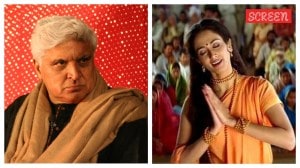Hot as Pickle
Summer is the season for seasonings,and debates over them,at the home of BJP spokesperson Nirmala Sitharaman
Summer is the season for seasonings,and debates over them,at the home of BJP spokesperson Nirmala Sitharaman
You might catch her on your television screen,arguing a fine political point,diligently holding up her party8217;s end of the debate. But for now,BJP national spokesperson Nirmala Sitharaman will take a step back from the political fray and head home to Hyderabad for some unusual non-political activity. With the Anna storm receding and verdicts in the five assembly elections not yet in,its that in-between time in the capital anyway. In this period of political lull,Sitharaman is preparing to steal a small break from the TV studios and OB vans that punctuate her days in Delhi,to immerse herself in an abiding family tradition at home: making mango pickle.
Making mango pickle for the household for the entire year is a pan-Andhra Pradesh ritual, she says. It may be a little more pronounced in the coastal areas,less so in Telangana,but at this time of the year,you can feel it in the air,across the state. From April-end to the third week of May,after the raw mangoes have entered the market and before the dry and dusty wind starts blowing in from Kerala,announcing the imminent arrival of the monsoon in Andhra,its as if there is only one talking point in the state. Everyone obsesses about the mango achar pickle being made at home, she says.
For Nirmala,who joined the BJP in 2008 and became the partys national spokesperson in March 2010,but still lives out of a suitcase in Delhi,going back home to make pickle is occasion to spend time with her family. She also looks forward to the opportunity to let her guard down,to submit to a ritual she knows by rote,one she has learnt to enjoy as much as the fiery pickle that is its outcome. Coming from Tamil Nadu,she was familiar with the annual exercise,says Nirmala,but unprepared for the elaborate and fastidious pickle ceremonials in the joint family home she shares with her in-laws in Hyderabad.
First,four kinds of mango,of varying fibre and sourness,for the four varieties of pickle to be made over the next four days,are picked from the early morning market. This responsibility is assigned to her and Sudhakar,her brother-in-law,who,she says admiringly,can judge subtle differences in sourness while tasting 10 varieties of mango at a go. Slim,spicy Guntur chillies,and juicier Warangal ones are carefully chosen and pounded. And each handful of mustard is scrutinised for purity.
The pickle-making process doesnt call for autocracy. All must give their opinion,the pickle must benefit from their collective genius, she says. The turmeric is less troublesome but arguments heat up over the til oil,and then,the salt,and the effect of its iodine content on the pickles longevity and colour.
Once the mangoes are washed and dried,Sudhakar returns centre stage,to chop them deftly with a long-handled broad blade,one end fixed to a wooden plank. Curious children are shooed away as the powdered spices are hand-mixed with the mango pieces by the women of the house,sitting on the floor. At this stage,I sit next to my mother-in-law, says Sitharaman. My job is to pour the oil at her command,so that the mixture is not too oily,not too dry. This is then transferred to porcelain pots or jadis,which are covered with cloth and put away in the designated achar corner of the storeroom.
On Day Four comes the biggest,most unglamorous job of all: packing the pickle for the married daughters of the house,especially the NRIs. Sitharaman,too,will carry some back to Delhi. But the pickle cant be packed before it has been tasted and certified,and that privilege is conceded to the men in the house. Words must be carefully chosen at this stage. Any loose judgment will come back to haunt family conversations over the rest of the year. Sudhakar is good at assessing one kind of achar, says Sitharaman,but my husband Prabhakar is the best judge of all.
For Prabhakar,the test is simple: when you mix the pickle with rice and eat it,you must sweat at the nape. For the last few years,though,their college-going daughter Vangmayi has taken over his job. My mother-in-law felt that her son was becoming too diplomatic. He didnt want to hurt her feelings. Her grand-daughter has no such compunctions, she says,smiling.
- 01
- 02
- 03
- 04
- 05































